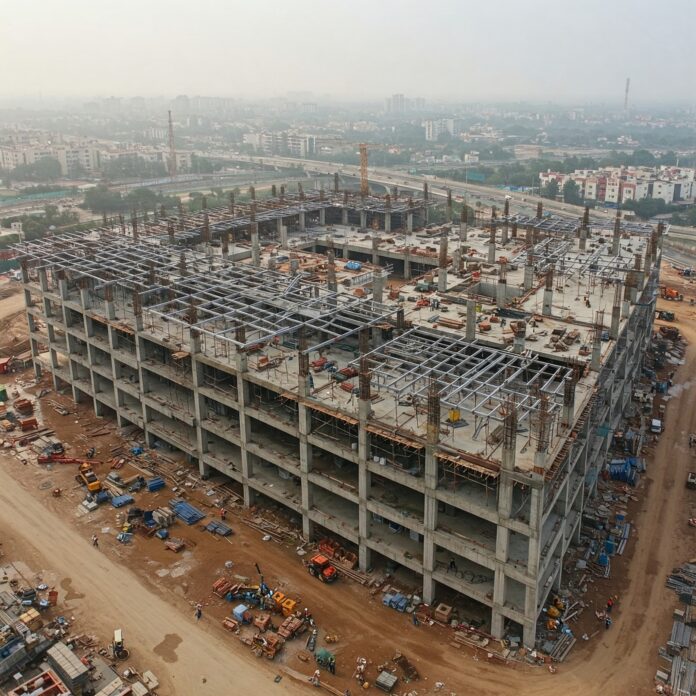Greater Noida, India – The dreams of thousands of homebuyers in Greater Noida remain in limbo as over 8,000 flat registries are reportedly stuck across several housing projects. The primary reason behind this widespread issue is the substantial dues owed by real estate developers to the Greater Noida Authority, estimated to be over ₹400 crore in some cases. This has created a complex impasse, leaving buyers without legal ownership of their properties despite having paid a significant portion, or even the full amount, for their homes.
The issue is not new to the region, which falls under the purview of the Uttar Pradesh State Industrial Development Authority (UPSIDA) and the Greater Noida Industrial Development Authority (GNIDA). For years, a significant number of group housing projects have been plagued by delays in construction and consequently, the registration of flats. While land parcels for many of these projects were allotted over a decade ago, a combination of factors has led to the current predicament.
One of the major contributing factors is the outstanding financial dues that builders owe to the authorities. These dues often stem from the cost of land, as well as other charges and penalties. The non-payment of these dues by developers has resulted in authorities withholding crucial permissions, including completion certificates (CC) and occupancy certificates (OC), which are necessary for the registration of properties. Without these certificates, the final step of getting the flat registered in the buyer’s name cannot be completed.
The problem is further compounded by incomplete construction in many projects. Even in projects where some towers or phases are ready for possession, the overall project might be stalled due to financial constraints or legal disputes, preventing the issuance of partial or full completion certificates. This leaves buyers who have taken possession of their flats in a precarious position, as they do not have legal ownership.
Legal hurdles and disputes between developers and the authorities also play a significant role in the delayed registries. These disputes can range from issues related to land acquisition, changes in building plans (such as Floor Area Ratio or FAR), and the interpretation of contractual obligations. These legal battles often drag on for years, further delaying project completion and registration.
The impact on homebuyers is severe. Many buyers have invested their life savings and taken home loans, and are now burdened with paying both EMIs and, in many cases, rent for alternative accommodation. The inability to get their flats registered means they do not have legal title to their property, which can affect their ability to sell, lease, or even undertake renovations. The uncertainty and the long wait have caused immense stress and financial hardship for thousands of families. Homebuyers have been organizing protests and seeking government intervention to resolve the issue.
In response to the persistent problem of stalled projects and pending registries, the Uttar Pradesh government has introduced various policies and measures aimed at providing relief to homebuyers and facilitating the completion of projects. One such significant step has been the implementation of recommendations from committees, such as the Amitabh Kant committee, which were formed to address the issues plaguing the real estate sector in the region.
These recommendations often include provisions for a ‘zero period’ for developers, offering a waiver on interest and penalties for a specific duration, particularly covering periods when construction was impacted by events like the COVID-19 pandemic or court-ordered halts. The policies also aim to facilitate the resolution of financial disputes by offering structured payment plans for developers to clear their outstanding dues. Some policies also allow for the possibility of bringing in co-developers to complete financially viable projects.
A key aspect of the proposed solutions is the delinking of flat registries from the total outstanding dues of the builder at the project level. This means that even if a builder has significant dues, authorities can allow the registration of individual flats for which the proportionate dues have been cleared or a certain percentage of the total dues for the project has been paid. This aims to provide immediate relief to homebuyers who have fulfilled their financial obligations to the builder.
However, the implementation of these policies has faced challenges. Developers are required to adhere to the conditions outlined in the policies, such as making upfront payments of a certain percentage of the outstanding dues to become eligible for the benefits. While some developers have come forward and opted for the rehabilitation packages, others have been slow to comply or are facing insolvency proceedings.
The authorities, on their part, have been taking steps to expedite the process and also initiate punitive measures against non-compliant developers. This includes issuing notices, initiating recovery proceedings, and in some cases, considering the cancellation of land allotments. Efforts are also being made to streamline the process of issuing completion and occupancy certificates.
The issue of stuck registries in Greater Noida is a complex one, involving multiple stakeholders including homebuyers, developers, and the development authorities. While steps are being taken to address the problem, a lasting solution requires concerted efforts from all parties involved. Timely and transparent implementation of government policies, coupled with a commitment from developers to fulfill their obligations and proactive measures by the authorities to resolve disputes and facilitate registrations, are crucial to restoring the confidence of homebuyers and ensuring they finally get legal ownership of their homes.
The situation underscores the need for stronger regulatory oversight in the real estate sector to prevent such issues from arising in the future and to protect the interests of homebuyers. Learning from the experiences in Greater Noida and other similar regions is essential to build a more transparent and accountable real estate market.

